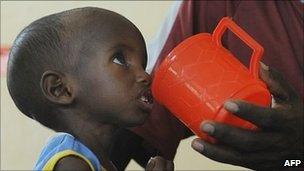Africa drought: World 'must do more' - Andrew Mitchell
- Published

East Africa is experiencing the worst drought in 60 years, according to the UN
Too many countries have not woken up to the scale of east Africa's drought, the International Development Secretary Andrew Mitchell has said.
He spoke as planes with UK-backed aid arrived in Somalia and convoys reached Kenyan and Ethiopian refugee camps.
Britons have donated £42m - and the UK government £95m - to get food, water and medicine to some 12 million people.
Mr Mitchell called on other nations to bolster a United Nations appeal for $2.4bn (£1.45bn), which is 60% short.
The drought has devastated cattle and crops, leading to a famine declaration in two regions of Somalia. Other areas are expected to follow.
The Disasters Emergency Committee, which represents 14 UK-based aid groups, revealed the £42m donated by the UK public on Tuesday.
Mr Mitchell said aid from the UK was helping 200,000 people in Somalia and two million across the wider region.
"British aid is getting through to thousands of families as we speak and that help will save lives," he said.
'Failure risk'
However, he added: "Too many countries have failed to wake up to the scale of the situation and the response that is needed.
"It is time for people to step up their response or risk failing thousands of men, women and children who are in need of our help."
Aid flights landed in Somalia's Mogadishu and Baidoa airports, and lorry convoys have reached Kenya's Dadaab refugee camp and the Dolo Ado camp in Ethiopia, according to the Department for International Development (DFID).
Thousands of people in Kenyan refugee camps have now received crucial basic supplies such as tents and cooking equipment, as well as medical equipment and safe drinking water.
An aid tracker, external has been set up on the DFID website to update the public as to where funding is being channelled.
Meanwhile, Somali telecommunications firm Hormud says it has distributed food aid to famine victims in areas controlled by the Islamist group, al-Shabab.
A company spokesman told the BBC that food had been given to 1,500 families in Baidoa, while a further 2,000 would get aid in the Bakol region.
Al-Shabab, which has prevented some international aid agencies working in areas it controls, had provided security for the operation but all the food had been handed out by company representatives, he added.